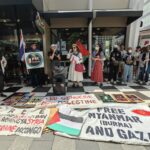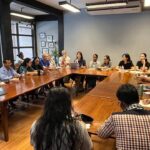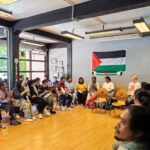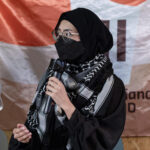By Jacques-chai Chomthongdi
Last year, we were less than fifteen, but at this year’s WTO July General Council meeting more than 300 civil society representatives were present in Geneva. Public debates, workshops, meetings, street mobilizations and actions were organized and joined by various groups from different parts of the world.
Without doubt, what was happening at the counter event — known as the “General Council of People”– was a lot more exciting than the talk inside the WTO. More importantly, while inside the WTO, government negotiators and corporate lobbyists could not agree on the formulae to open up markets and carve-up trade profits, outside the WTO an unambiguous common position on the WTO has emerged among trade activists and social movements. This can be summed up as “no deal is better than bad deal”. For most people, it is now obvious that in the current context of negotiations the only possible deal that the WTO could produce at the end of this year in Hong Kong is a bad deal.
This convergence of analysis and understanding among activists is crucial for a strong campaign in the run up to Hong Kong. Still, there are a lot of challenges ahead of us.
Right after the WTO summer break, a very intense negotiation is anticipated and it seems that Geneva is going to be centre stage. During the last Trade Negotiation Committee (TNC) meeting, the chairperson called for all members to focus their energies on Geneva. This of course implies a central role for the WTO secretariat right at the moment when former EU trade commissioner Pascal Lamy takes over the helm. However, this in no way guarantees a more transparent and fairer negotiation process. Not only has the WTO secretariat never challenged the legitimacy of untransparent practices, such as the green rooms, mini-ministerials, and the use of the WTO facilities by corporations (to lobby governments), it often legitimizes, even facilitates, such processes. Undoubtedly, the green room process is going to be intense in the coming months and a mini-ministerial is reportedly scheduled in town before the October General Council.
ALL EYES ON GENEVA IN OCTOBER
Northern governments are determined to squeeze developing countries for the most profit possible for their transnational corporations in this round. In order to achieve that, they need to establish a narrow framework for further negotiations as soon as possible, in which October will be a critical moment. On the part of the civil society, we also know that it is imperative to concentrate our efforts on Geneva this October. We were more than three hundred in July, but it will take much more than that to make a difference.
Clearly, a lot more people must be in Geneva this time around. This means much more work needs to be done to mobilise the Genevois and the Swiss, and activists and movements from nearby regions and countries. But numbers are not the only crucial factor. Also key to the success of the October people’s event is the broad representation of people from various sectors and from different parts of the world, particularly from the South. One of the good aspects of July mobilisation was that we had an interesting representation from social movements and NGOs from the South, but we must, and can, do better than that. Of course, to make it possible, more financial support is needed, but it is also important for trade activists in the South to understand the important of coming to Geneva, and realize that their contribution here is vital.
LINKING TO THE LOCAL CAMPAIGNS
Apart from the public events and mobilisations, the interaction with key countries delegations in Geneva is strategically important and the possibility of having civil society representatives from the same country as the officials with whom we meet leads to a more meaningful interaction and creates a sense of accountability with the government delegates. While we had interesting meeting with a number of missions in July, some were not ready to spare the time.. This may be even more evident in October when many ministers are likely to be in town. That means we should be ready to employ new, innovative ways to get the messages through, in case a normal rendezvous is ignored.
There is a real danger of Geneva-based NGOs becoming detached from the work at the grassroots and national levels if there is not enough exchange and interaction. The General Council of People at the end of July was partly an attempt to bridge and create more synergy between the work in Geneva and campaigns in different countries and regions. However, in order to achieve complementary and coherent work, an event in itself is far from sufficient. The involvement of national campaigners and social movements in the preparation process for the mobilization and related activities in Geneva is vital. The inputs from national campaigns into the building up of arguments and debates in Geneva were lacking in July. This means there is much more that could be done in reaching-out and reaching-in between Geneva and beyond.
This does not mean that Geneva should become the centre of gravity in the people’s campaign against trade liberalization. On the contrary; the aim of mobilising in Geneva is to make the WTO and its corporate-oriented trade agenda irrelevant to people’s lives, and this can only be achieved by ensuring that our campaigns at different levels support and strengthen each other.
The Geneva People’s Alliance (www.omc-wto.org) is committed to provide and facilitate a space for debates, strategy meetings, mobilization, and other activities in Geneva this October. Join us!
* Jacques Chai Chomthongdi works with Focus on the Global South. He is based in Geneva and is active in the Geneva Peoples Alliance. For more information on the Geneva mobilisations go to (www.omc-wto.org).






